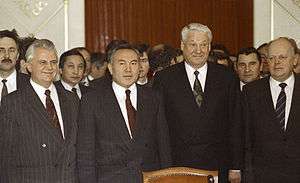Alma-Ata Protocol
|
Signing ceremony | |
| Type | Treaty establishing a founding declarations and principles of the Commonwealth of Independent States (CIS). |
|---|---|
| Signed | 21 December 1991 |
| Location | Alma-Ata, Kazakhstan |
| Effective | 21 December 1991 |
| Signatories |
|
The Alma-Ata Protocols are the founding declarations and principles of the Commonwealth of Independent States (CIS).
The leaders of Russia, Ukraine, and Belarus had agreed to the Belavezha Accords on 8 December 1991, dissolving the Soviet Union and forming the CIS. On 21 December 1991, Armenia, Azerbaijan, Belarus, Kazakhstan, Kyrgyzstan, Moldova, Russia, Tajikistan, Turkmenistan, Ukraine, and Uzbekistan agreed to the Alma-Ata Protocols, joining the CIS. The latter agreement included the original three Belavezha signatories, as well as eight additional former Soviet republics.[1]
References
- ↑ "THE ALMA-ATA DECLARATION". Federal Research Division / Country Studies / Area Handbook Series / Belarus / Appendix C. Library of Congress.
External links
- The Alma-Ata Protocols (Russian language). Archive of Egor Gaidar
- The Alma-Ata Protocols (Russian language)
- English translation
This article is issued from Wikipedia - version of the 7/3/2016. The text is available under the Creative Commons Attribution/Share Alike but additional terms may apply for the media files.
